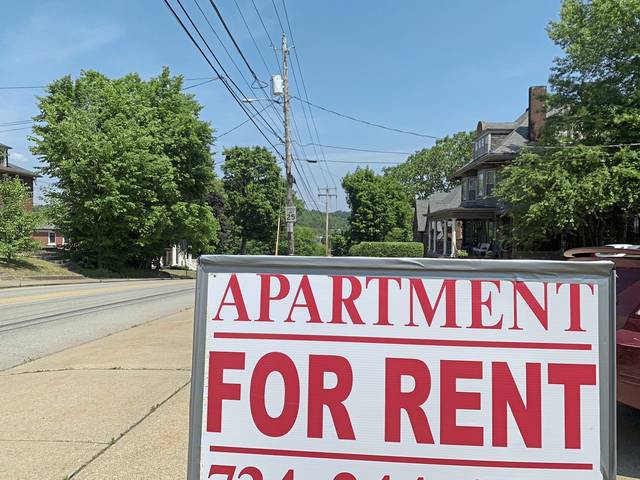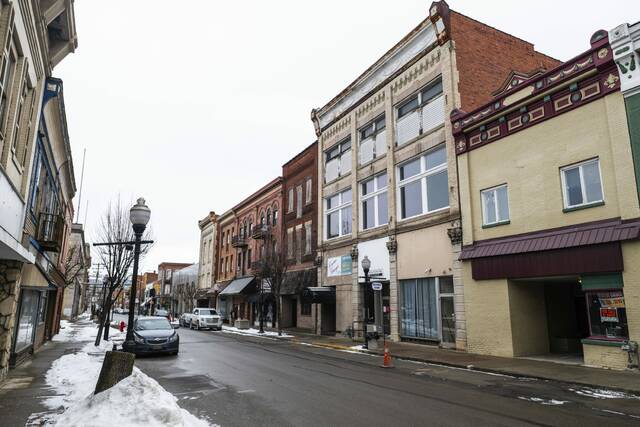A flood of landlord-tenant complaints could be on the way in courts across Pennsylvania as a moratorium on evictions for nonpayment of rent is set to be lifted Friday.
Jobs have been lost or hours cut during statewide shutdowns related to the coronavirus pandemic, leaving some renters in a precarious spot.
“We’re anticipating an uptick in those specific cases,” said Lauren Catalano, managing attorney of Laurel Legal Services in Greensburg. “People are having trouble bringing their payments current … because of people being out of work or on furlough.”
Local community leaders are bracing for such filings and advising tenants and landlords to try to work out a solution before seeking help from the courts. More than 2 million Pennsylvanians have filed for unemployment since mid-March when state and health officials ordered businesses to close in an effort to slow the virus’ spread.
In 2016, there were 1,300 eviction filings in Westmoreland County — of which, 512 resulted in a tenant being forced out of their home, according to Princeton University’s Eviction Lab project.
Allegheny County saw an average of 13,550 annual filings between 2012-19, mostly for nonpayment of rent, said Jane Downing, senior program officer of community and economic development with The Pittsburgh Foundation. There were about 2,500 evictions in the county in 2016, according to the Eviction Lab’s data.
“Everyone across the country is really expecting a very large influx of new eviction filings,” Downing said.
But some situations heading toward an eviction could be nullified if Gov. Tom Wolf extends the moratorium, said Phyllis Chamberlain, executive director of the Housing Alliance of Pennsylvania. A new $175 million program to help renters and mortgage holders through the Pennsylvania Housing Finance Agency started accepting applications Monday.
“This rental assistance program is going to do a lot of good for a lot of really vulnerable people and help many households hopefully avert an eviction crisis,” Chamberlain said.
Downing advised people considering the program to apply quickly. There is no allocation by county for the $150 million designated for renters and $25 million set aside for mortgage holders as part of the federal CARES Act.
“The truth is there’s not going to be enough money to address everyone in danger of being evicted,” she said.
Eviction process, impact
A landlord seeking to evict a tenant must first serve a notice to quit, which puts a tenant on alert.
If an agreement isn’t reached, a landlord-tenant complaint can be filed in district court and a hearing scheduled. A district judge can order back rent be paid if an eviction is granted. A tenant can appeal an eviction to the Court of Common Pleas.
Christopher Skovira, attorney with Avolio Law Group in Greensburg, said he expects a lot of landlord-tenant complaint filings on the horizon. For some landlords, it’s their livelihood.
“A lot of it depends on the client,” said Skovira, who works with some property management companies. “I’ve had a few clients that are more willing to work with” their tenants.
Those tenants oftentimes already were living paycheck-to-paycheck, Catalano said. Laurel Legal Services provides free civil help for low-income clients in a six-county area, including Armstrong, Indiana and Westmoreland.
Evictions can be traumatic to the lives of adults and children, and it can be extra challenging during the unprecedented times of the pandemic, said Michael Yonas, director of research and special initiatives with The Pittsburgh Foundation. There are numerous community organizations that offer rent help, such as the Society of St. Vincent de Paul and Westmoreland County Housing Authority.
Karen Snair, director of the Allegheny Valley Association of Churches, said a recent $15,000 grant from the foundation will support needy tenants. That funding will be directed toward people facing eviction because of pandemic-related financial issues.
“I expect that they’re going to increase more as time goes on and folks have been off work longer,” Snair said. “Those are really the folks we’re targeting.”
Looking for time, solutions
Twenty state Senate Democrats have asked Wolf to extend his order that prohibits any renter or homeowner from being evicted for nonpayment until Aug. 31 while the $175 million is disbursed, according to the Associated Press. Evictions related to other reasons are still permitted. Wolf’s administration plans to re-examine the order as the expiration date approaches, the AP said.
“We’re still in a pandemic … and we see growth in the virus and so putting people out on the street is not necessarily the best thing to do in that environment,” said State Sen. Vincent Hughes, D-Philadelphia/Montgomery. “I’m hoping the best senses of everyone will prevail and not go down the path of eviction and foreclosure.”
A federal moratorium on evictions applies to federally backed mortgages and other subsidized units, according to the National Housing Law Project. That ends July 25.
In the meantime, The Pittsburgh Foundation has been working on outreach with judges and supporting a pilot program that will bring tenants and landlords together in mediation to hopefully keep people in their homes, Downing said.
“What the pandemic has brought forward is that we really need a robust eviction prevention system,” she said.








